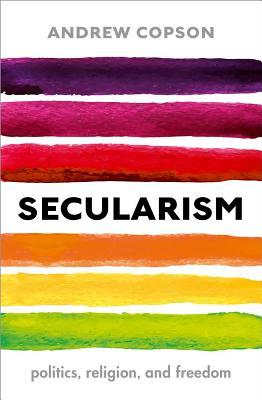The author is chief executive of Humanists UK, president of the International Humanist and Ethical Union, and a former director of the European Humanist Foundation. He describes his book as “not intended as an argument for secularism but as an introduction to it, in the hope that secularism will become better known as a concept and we can have more fruitful discussions and debates about it.” Why Mr. Copson supposes secularism to be not well known is unclear. It seems to me that the nature of the thing could hardly be more plain. Nor is it clear why he thinks there could be “fruitful discussions and debates” on the subject between secularists and believers, between whom a great chasm has been fixed. His first, lengthy chapter, “What is Secularism?,” is not an explanation of the phenomenon but a history of its progress in the increasingly “enlightened” West, as many people learned to reject “received wisdom and authoritarian politics,” which Copson obviously believes are inexorably, and uniquely, linked. He thinks secularism is both increasingly necessary in a “diverse” world and a contribution to its increasing diversity, which he views as valuable in its own right. Secularism, besides representing truth for him, is also a means toward a socially engineered and beneficial pluralism. Thus, he is concerned that the global rise in religious fervor, ethnic nationalism, totalitarianism, and the “rejection of democracy and liberalism . . . combine to threaten secularism as never before.” Yet, “Even in a world of diversity, we need a framework for our common life and most of us want that framework to be a fair one.” Like liberals everywhere, Copson is (willfully perhaps) blind to the fact that not only is it impossible for secularism to be a framework for a global society, it is precisely the progress secularism has made in the last several hundred years that has produced the reaction against it—and against diversity—he complains of.
In any event, secularism is, in the long run, a losing cause. Human beings are inherently religious creatures, in whom an idea of God and the instinct to worship Him are innate and ineradicable, whether or not they are aware of the fact or willing to accept it. People need something higher and larger and, above all, perhaps, more mysterious than themselves to believe in, and—self-evidently—neither secularism nor humanism, insofar as they differ from each other, can answer that need. Not only do they need to believe, they need something to make sacrifice to, and even to die for if necessary. There have been many martyrs to Christianity and other religions, but none that I know of for the faith of St. George Jacob Holyoake, the 19th-century British secularist “reformer” and devotee of reason, science, and “progress” to whom Mr. Copson pays respectful but unworshipful tribute at the start of his book. Many men have died for unrepentant heresy, or for liberty; but who has ever died for “secularism”?—the equivalent of dying for the removal of the chaplain of the House of Representatives, birth control, or (willingly, at least) even that secular sacrament, abortion?
[Secularism: Politics, Religion, and Freedom, by Andrew Copson (New York: Oxford University Press) 176 pp., $18.95]

Viewed from any one of three aspects (or all of them at once)—biography, history, and literature—this is, quite simply, a great book. MacCulloch, professor of Church History at Oxford University and the author of, among other works, a biography of Thomas Cramner and Christianity: The First Three Thousand Years, is well known in America as well as in Great Britain. MacCulloch describes Cromwell as having “shaped a great revolution in his own country’s affairs, which has in turn shaped much of the modern world, not least that still-Protestant power, the United States of America.” (It might be added that he succeeded also, however unintentionally, in destroying Christianity in the British Isles; an assessment with which the author, who is also a deacon in the Anglican Church, would not concur.) MacCulloch explains that his
primary purpose is not to write a history of England in the early sixteenth century, but to place Thomas Cromwell on that stage. The leading actor in the 1530s was not Cromwell but his king, Henry VIII, whose welfare and kaleidoscopic changes of mood would have occupied the thoughts of his minister for much of any day for an entire decade.
Yet this book is a biography of Cromwell, and Professor MacCulloch is much concerned with his subject’s concern—typical, he says, of Tudor statesmen—with founding a dynasty, with a personal religious agenda that motivated many or most of his political actions, with his determination to conceal those motives, and with the extent to which it brought about his ministerial downfall and his execution. A superb narrator who maintains a running pace and has a great appreciation and sense for the dramatic, MacCulloch records that on July 28, 1540, the date of Cromwell’s execution, Henry distracted himself from the event by marrying Catherine Howard; also that the corpse was buried in a chapel of the Tower close by Anne Boleyn, “the woman whose cause had brought him so high, and whose destruction he had choreographed.”
To repeat: a great work of scholarship, a great work of art.
[Thomas Cromwell: A Revolutionary Life, by Diarmaid MacCulloch (New York, NY: The Viking Press) 752 pp., $40.00]

Leave a Reply